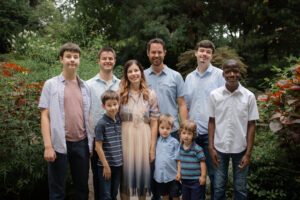 My son, who is 14, has autism. I also have six neurotypical kids. We never fit in anywhere we go. We are a large, biracial family and neurodiverse. People stare and make comments when we are out. We are used to it by now, but it is not easy. Sometimes I wish we looked “normal” and, more than that, I wish people would perceive us as “normal.” Someday maybe the world will not stare and point at our family but that is not my experience thus far.
My son, who is 14, has autism. I also have six neurotypical kids. We never fit in anywhere we go. We are a large, biracial family and neurodiverse. People stare and make comments when we are out. We are used to it by now, but it is not easy. Sometimes I wish we looked “normal” and, more than that, I wish people would perceive us as “normal.” Someday maybe the world will not stare and point at our family but that is not my experience thus far.
It can be lonely, being different. We do not often get invited to other people’s houses and honestly, when we do, it is stressful. This is the experience of many parents of children with autism. Over the past 14 years, as we went from having two neurotypical kids to seven kids, one of whom has autism, I have learned a few things about how important it is to have a good social support system for our family. It is vital for your mental and emotional wellbeing to prioritize social support systems. Let me share with you some places where you can find social supports for your family.
Support Groups
The easiest way to find other families that are like yours is to join a support group for families affected by autism. The Autism Society of North Carolina (ASNC) has Support Groups in most of the counties in North Carolina and you can use this link to find a Support Group near you. These support groups are a vital source of support and information for many families across the state. They meet regularly to provide social gatherings and activities for families. That way families can be assured that they can participate in social outings where others have made accommodations for their child and understand the challenges and joys of raising a child with autism.
Family and friends
 If you happen to have extended family nearby, they can be an excellent support system. Often, however, extended family members who want to be helpful may need information and understanding about how to help. ASNC provides blogs and workshops that promote understanding of autism, and it can be helpful to share those with your extended family as well as ASNC’s series of pre-recorded webinars. It is also helpful to communicate in detail, specific ways extended family can be supportive of your loved one with autism and their unique needs.
If you happen to have extended family nearby, they can be an excellent support system. Often, however, extended family members who want to be helpful may need information and understanding about how to help. ASNC provides blogs and workshops that promote understanding of autism, and it can be helpful to share those with your extended family as well as ASNC’s series of pre-recorded webinars. It is also helpful to communicate in detail, specific ways extended family can be supportive of your loved one with autism and their unique needs.
For example, extended family members often mean well but can unintentionally do things that are disruptive or confusing. Over the years, we have coached our parents in the best ways to interact with our son, and they have been very receptive to learning. They often provide us with the respite we need, and we are thankful for that.
We have done the same with friends, providing real-time guidance on how to best connect with our son. We often end up hosting family and friends’ gatherings at our home because it is easier for our son to be in his own space. Everyone around us has been incredibly supportive and understanding of this need. We have made intentional efforts to connect with other families with special needs kids who understand our needs. And we have also had to allow some friendships to fade away, and that is okay too.
Religious communities
 Religious communities can be another excellent source of support, particularly if they are knowledgeable about autism. We have recently changed churches to find one that is specifically equipped to meet our son’s needs. They have a special needs ministry specifically for individuals with needs such as his. When he is with us in church, others are tolerant of his behaviors, and we feel like we fit in there. Some churches want to be inclusive, but they lack knowledge about autism to really be able to support families. In that case, ASNC has a toolkit to help religious communities understand how they can best serve families affected by autism. It has been so important for us to find the right fit in a church for our son and our family, as it is a vital part of our support system.
Religious communities can be another excellent source of support, particularly if they are knowledgeable about autism. We have recently changed churches to find one that is specifically equipped to meet our son’s needs. They have a special needs ministry specifically for individuals with needs such as his. When he is with us in church, others are tolerant of his behaviors, and we feel like we fit in there. Some churches want to be inclusive, but they lack knowledge about autism to really be able to support families. In that case, ASNC has a toolkit to help religious communities understand how they can best serve families affected by autism. It has been so important for us to find the right fit in a church for our son and our family, as it is a vital part of our support system.
Keep trying
Social support systems are so important to every family. We all need one another. We need to be understood and belong. It is possible to find that as a family affected by autism, but it takes a lot of effort. Keep trying – it is worth it.
Tags: social supports, Support Groups Go back
